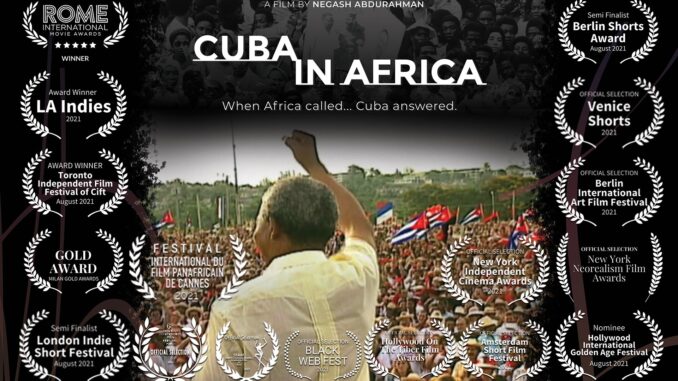
By Yassir Azzam
“Cuba en África–Cuando África Llamó…Cuba Respondió” (“Cuba in Africa–When Africa Called…Cuba Responded”). These words lit up the screen introducing “Cuba in Africa,” a film by Nagash Abdurahman that examines Cuba’s relationship in helping South Africa end apartheid.
As a part of Black Solidarity Day on Nov. 4, this film screening was one of many events organized in partnership with the Black and Latino Male Initiative (BLMI), the Black Faculty and Staff (BFS), and the Black Solidarity Day Committee. Among the other events were “Call to Student Clubs: Campus Impact Discussion” and an “Election Open Mic Discussion.” In choosing to screen this film, organizers wanted to connect this activism with the activism that led to Black Solidarity Day.
“We wanted to emphasize the global struggle that also inspired Black Solidarity Day,” Lawrence Johnson, a lead organizer and a professor of sociology at BC, told The Vanguard. “There’s no greater example than the 380,000 people that Cuba sent to southern Africa to help end colonialism and apartheid.”
Abdurahman’s 22-minute film presented archival interview footage of the many leaders who worked to end apartheid. The film captures the story of over 380,000 Cuban teachers, nurses, soldiers, and doctors who united to help South Africa. Although this action was ultimately successful, it is often overlooked when discussing the broader struggles of that era. As stated in the documentary, the Cubans felt indebted to the enslaved Africans whose blood, sweat, and tears built the cobblestone streets and cities they walk through today. The film illustrated the profound human gift of giving and mutual support, underscoring the significance of solidarity in ending racial struggles.
“This untold story also highlights the African presence in Latin America, Cuba’s support of the Black Freedom Struggle here in the U.S., and the positive relationship between Cuba and Haiti, two countries whose revolutionary past inspires stronger bonds towards freedom,” said Johnson.
Abdurahman explained at the event that it took a decade of dedicated effort and nearly all of his financial resources to create the film. Although PBS initially supported the project and requested a two-hour documentary, their vision conflicted with the film’s direction. Despite these challenges, the film was able to be made.
Students interested in learning more about Black Solidarity Day can follow the committee on Instagram @blacksolidaritydaycommittee_bc
